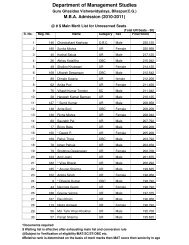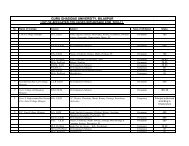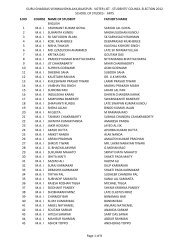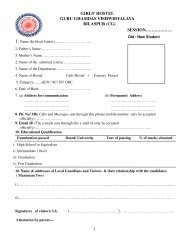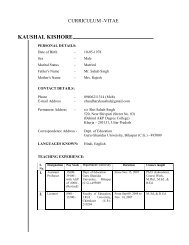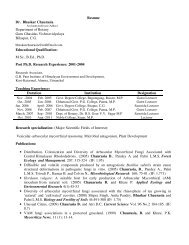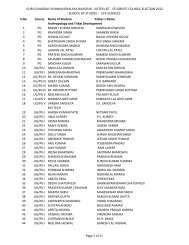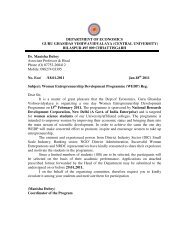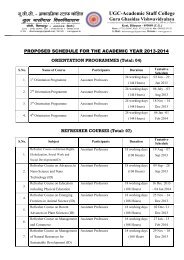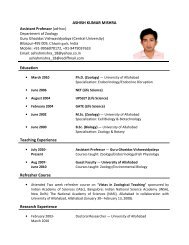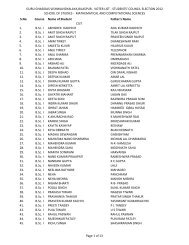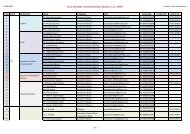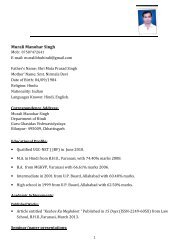Syllabus - Guru Ghasidas University
Syllabus - Guru Ghasidas University
Syllabus - Guru Ghasidas University
Create successful ePaper yourself
Turn your PDF publications into a flip-book with our unique Google optimized e-Paper software.
GURU GHASIDAS VISHWAVIDYALAYA,BILASPUR (C.G.)(A Central <strong>University</strong>)<strong>Syllabus</strong>ofM.Ed.DEPARTMENT OF EDUCATION
1. PHILOSOPHICAL FOUNDATIONS OF EDUCATIONCOURSE OBJECTIVESThe philosophical component of this (Foundation) core paper for a post-graduate coursein Education (Professional) aims at developing the following competencies amongst thescholars.1. Understanding the nature and functions of philosophy of education.2. Logical analysis, interpretation and synthesis of various concepts, proposition andphilosophical assumptions about educational phenomena.3. Understanding and use of philosophical methods in studying educational data.4. Critical appraisal of contributions made to education by prominent educationalthinkers – Indian and Western.Theory: 35 MarksCOURSE CONTENTSUNIT I• Philosophy of Education : Its nature – Directive Doctrine; A Liberal Discipline;An activity• Its Function – Speculative, Normative, AnalyticalUNIT II• Metaphysical Problems and Education related to Nature, Man and Society• Impact of Philosophical suppositions on education made by –Idealism,Realism, Pragmatism, Existentialism, Vedanta (Advaita & Veshitadvaitaonly), Sankhya School of thoughtUNIT III• Epistemology and Education: Knowledge; methods of acquiring validknowledge with specific reference to Analytic philosophy, Dialecticalapproach, scientific inquiry, Nyaya, Yoga.UNIT IV• Axiology and Education: Critical appreciation of the contribution made byBuddhism, Jainism, Bhagavadgita, and Islam to education in terms of valueformulation.UNIT VContribution of Vivekananda, Tagore, Gandhi, Aurobindo, Plato, and Dewey toeducational thought and practice with special reference to their views on manand process of development, socio-cultural scenario and global perspective.Modern concept of Philosophy: Analysis-Logical analysis, Logical empiricismand positive relativism
INTERNAL EVALUATION-(Total Marks: 15)• Attendance- (05marks)• One Class Test -(10 marks)OrOne assignment /presentation on a given topic (5 marks) andWriting Annotated Bibliography (5 marks)
2. PSYCHOLOGICAL FOUNDATIONS OF EDUCATION-I(DEVELOPMENT, LEARNING & INDIVIDUAL DIFFERENCE)COURSE OBJECTIVES1. To enable the student to understand concept and principles for EducationalPsychology as an applied science.2. To enable the learner to understand implications of learning and otherpsychological theories for education.3. To enable the students to understand the concept of individual differences.4. To acquaint the leaner with the process of development of various abilities andtraits.COURSE CONTENTSUNIT IEducational Psychology: Concept, concern and scope of Educational psychology,contribution of psychology to education.UNIT II• Human Development: Concept, principles, sequential stages of development;factors influencing development and their relative roles, general characteristicsand problem of each stage.• Theories of Piaget and Bruner- major concepts and stages and implications foreducation.UNIT IIILearning : Concept, kinds, levels of learning, various view points of learning, Gange’sconditions of learning cognitive view point and information processing; issues related tolearning. Educational implications of the view points on learningUNIT IVIndividual Difference: Concept of intra–inter difference in reference toa) Interests, attitude and values.b) Adjustment of teaching – learning process to suit individual difference –learning style and teaching strategiesTheory: 35 MarksUNIT V• Intelligence and cognitive abilities, identification and its measurement.• Creativity – Nature, Process Identification, fostering and guiding creativechildren.
INTERNAL EVALUATION-(Total Marks: 15)• Attendance- (05marks)• Administration and interpretation of total three psychological tests/experimentsout of the following: (05 marks)(Students have to maintain a record book) Transfer of learning Fatigue Measurement of Creativity Measurement of Attitude Level of AspirationViva-voce on the above three selected tests-(05 Marks)
3. FOUNDATIONS OF EDUCATIONAL RESEARCHCOURSE OBJECTIVESAfter undergoing this course the students will be able to:-1. Explain and describe the meaning of Scientific Method, Scientific Inquiry,Paradigm, Theory and their implications for educational research.2. Describe characteristics of philosophical, psychological and sociological researchparadigms as they apply to educational research.3. Explain and adopt different strategies of research to solve educational problems.4. Write research proposals.COURSE CONTENTUNIT I: Nature of research, knowledge and inquiry• Nature and sources of knowledge. Scientific method of inquiry and its role inknowledge generation.• Meaning and nature of research, its need and purpose and scope ofeducational research.• Fundamental, applied and action research.UNIT II: Formulation of Research Problem• Research Problem: Sources, characteristics and delimitation.• Delineating and opertaionalizing variables• Setting objectives of the study.• Hypothesis : Its types, sources and characteristics of a good hypothesis,different types of hypothesis, difference between assumptions and hypothesesUNIT III: SamplingConcept of population and sample.Various methods of probability and non-probability sampling.Characteristics of a good sample.Sampling errors and how to reduce them.UNIT IV: Major Approaches/Methods of Research- I• Descriptive research – Normative survey, Developmental (longitudinal and crosssectionalapproach), Ex-post facto, Case study• Historical research- Primary and secondary resources, internal and externalcriticism.Theory: 35 Marks
UNIT V: Major Approaches/Methods of Research -II• Experimental research –Experimental designs, internal and external validity• Qualitative approach of educational research – Ethnographic study, naturalisticinquiry, and Phenomenological research• Steps in preparing research proposal.INTERNAL EVALUATION-(Total Marks: 15)• Attendance- (05marks)• One Class Test -(10 marks)OrOne assignment /presentation on a given topic (5 marks) andReview of a research papers published in educational journals/Review of a Ph.D.Thesis or M.Phil. Dissertation in Education. (5 Marks)
4. OPTIONAL PAPER (GROUP – I)4.1 EDUCATIONAL TECHNOLOGYTheory Marks: 70COURSE OBJECTIVES1. To enable the students teacher to understand about the meaning, nature and scopeand significance of E.T. and its important components in terms of Hardware andSoftware.2. To help the students teachers to distinguish between communication andinstruction so that they can develop and design a sound instructional system.3. To acquaint students teachers with levels, strategies and models of teaching forfuture improvement.4. To enable the students teachers to understand about the importance ofprogrammed instructions and researches in E.T.5. To acquaint the student teachers with emerging trends in ET along with theresource centres of ET.COURSE CONTENTSUNIT I: Concept of Educational Technology• Meaning, Nature, Scope and significance of ET.• Components of ET: Software, hardware.• Educational technology and instructional technology.UNIT II: Communication and Instruction• Concept, Nature, Process, Components, Types, Modes and barriers ofcommunication, Classroom Communication (verbal and non verbal). Mass mediaapproach in Educational Technology.• Designing Instructional System: Formulation of instructional objectives, Taskanalysis, designing of instructional strategies such as lecture, team teaching,discussion, panel discussion, seminar and tutorials.
UNIT III: Teaching levels, Strategies & Models• Memory, Understanding and Reflective levels of teaching.• Teaching strategies: Meaning, Nature, Functions and Types• Models of teaching: Meaning, Nature, Functions and Types (PsychologicalModels and Modern Models of Teaching).• Modification of teaching behaviour: Micro teaching, Flander’s InteractionAnalysis, Simulation.UNIT IV: Programmed instruction• Origin and types – linear and branching.• Development of the progarmmed instruction material• Teaching machines• Computer Assisted InstructionUNIT V: New Trends in Educational Technology• Educational technology in formal, non-formal and Informal Education, OpenLearning Systems and Educational Technology.• Emerging trends in Educational Technology, Videotape, Radio-vision,• Tele conferencing, CCTV, INSAT – Problems of New Technologies.• Evaluation and Educational Technology.• Resource Centers for Educational Technology, CIET, UGC, State ET Cells,AVRC, EMRC, NIST etc. – their activity for the improvement of teachinglearningINTERNAL EVALUATION-(Total Marks: 30)• Attendance- (05marks)• One Class Test/ power point presentation on a given topic -(10 marks)• One Class Test -(15 marks)
OrPreparation of a Programmed Instructional Material -(15 marks)
4.2 EDUCATIONAL MEASUREMENT & EVALUATIONTheory Marks: 70COURSE OBJECTIVESTo acquaint the student with the basic concepts and practices adopted in educationalmeasurement and educational evaluation.To help the student understand relationship between measurement and evaluation ineducation.To orient the student with tools and techniques of measurement and evaluation.To develop skills and competencies in constructing and standardizing a test.To make the students understand how various requirements of education are measured,evaluated, interpreted and their result recorded to help learners.COURSE CONTENTSUNIT I: The Measurement and Evaluation Process• Concept, scope and need, Taxonomies of educational objectives, normreferencedand criterion-referenced measurement.• Evaluation: Functions of evaluation, and the basic principles of evaluation.• Evaluation and Curriculum• Interrelationship between measurement and evaluation in education.UNIT II: Tools of Measurement and Evaluation• Basic characteristics of a good tool.• Types of Tool.• Subjective and objective tools, essay test, objective test, scales,questionnaires, schedules, inventories, performance tests.UNIT III: Test Construction• General principles of test construction and its standardization• Writing test items – objective type, essay type and interpretive type.• Item analysis procedures for norm-referenced and criterion referenced,mastery tests.• Standard scores: T-scores, and C-scores. Interpretations of test scores.UNIT IV: Measurement of psychological traits and their interpretationsMeasurement of Achievement, Aptitudes, Intelligence, Attitudes,
InterestUNIT V: Recent / New trends in educationGradingSemester systemContinuous Internal Assessment /Continuous ComprehensiveEvaluation.Question BankUse of Computers in EvaluationQualitative analysisINTERNAL EVALUATION-(Total Marks: 30)• Attendance- (05marks)• One Class Test/ power point presentation on a given topic -(10 marks)• One Class Test -(15 marks)OrConstruction of an Achievement Test (15 marks)
SEMESTER-II7. SOCIOLOGICAL FOUNDATIONS OF EDUCATIONCOURSE OBJECTIVES Theory Marks: 351. To enable the student to understand concept and process of social organization,social stratification and institution.2. To enable the student to understand relationship between culture, society andeducation.3. To enable the student to know issues of equality, excellence and inequalities ineducation.COURSE CONTENTSUNIT I• Concept and nature of sociology of Education, Difference between sociology ofEducation and Educational Sociology.• Social organization; social groups; social stratification; social mobility and factorsinfluencing so.• Social organization, characteristics of social organisation; institutions, attitude andValues.UNIT II• Education and Culture – meaning and nature of Culture, Role of educationin cultural context; Education and cultural change.• Education and modernization• Education and religionUNIT III• Education and Society – Education as a social system, as a socializationprocess and a process of social progress and change.
• Meaning and nature of social change, Constraints on social change in India(caste, ethnicity, class, language, religion, and regionalism)UNIT IV• Issues of equality of educational opportunity and excellence in education.Equality vs. equity in education• Education of socially and economically disadvantaged sections of society withspecial reference to SC, ST, Women, Rural population, and DisabledUNIT V• Education and Democracy, Constitutional provisions for education;Nationalism and Education; Education for national integration andInternational understandingINTERNAL EVALUATION-(Total Marks: 15)• Attendance- (05marks)• One Class Test -(10 marks)OrOne assignment /presentation on a given topic (5 marks) andBook review (one) (5 Marks)
8. PSYCHOLOGICAL FOUNDATION OF EDUCATION-II(PERSONALITY, ADJUSTMENT AND MENTAL HEALTH)COURSE OBJECTIVES Theory Marks: 351. To acquaint the learner with the process of assessment of personality.2. To enable the students to understand a concept of group dynamics.3. To make them understand the concept of adjustment and mental health.4. To develop the skill of administration and interpretation of psychological tests.COURSE CONTENTSUNIT I• Group Dynamics: Group process, interpersonal relations, sociometric grouping,social emotional climates of the classroom and influence of teachercharacteristics.UNIT II• Personality: Concept, development, structure and dynamics of personality.• Theories of personality – Allport, Eysenck; Psychoanalytic approach of Freud,Erickson; Behaviour approach – Miller, Dollard and Bandura; Humanisticapproach – Roger, MaslowUNIT IIIAssessment of Personality – Techniquesa) Personality inventories – rating scalesb) Projective techniques : Rorschach, TAT,SAT,WATUNIT IVAdjustmenta) Concept,b) Mechanism of adjustment –c) Defense mechanism-escape, withdrawal, compensation, etc.UNIT VMental Healtha) Introduction to common forms of neuroses, psychosis and somatic disorders.b) Principles of mental hygiene – preventive, constructive, curative measure,c) Implications for education
INTERNAL EVALUATION-(Total Marks: 15)• Attendance- (05marks)• Administration and interpretation of total three psychological tests/experimentsout of the following:05 Marks(Students have to maintain a record book)-Viva-voce on the above three selected testsAn individual (performance) test of IntelligenceA group test of IntelligenceMeasurement of PersonalityAdjustment InventoryAnxiety Scale05 Marks
9. TOOLS, TECHNIQUES AND METHODS OF DATA ANALYSISCOURSE OBJECTIVESAfter undergoing this course the students will be able to:-Theory Marks: 351. Develop the vision to carry out qualitative and quantitative research.2. Develop various types of research tools for data collection.3. Apply important qualitative and quantitative statistical techniques for analyzingand interpreting research data.4. Write scientific reports.COURSE CONTENTSUNIT I: Tools and Techniques of Data Collection• Observation; Interview; Socio metric techniques.• Questionnaire, Schedules, Rating Scales with special reference to summativescales• Reliability and validity of data collection tools.UNIT II• Nature of educational data: Quantitative and Qualitative.• Scales of Measurement – Nominal, Ordinal, Interval, and Ratio• Organization and representation of data: Frequency distribution, Frequencypolygon, Histogram, Ogive, Smoothed frequency curveUNIT III• Brief review of measures of central tendency and measures of variability• Correlation: Partial and multiple correlation, Bi-serial, Point Bi-serial, Tetrachoric, and Phi-coefficientUNIT IV• Properties and uses of the Normal Probability DistributionUNIT V• Inferential statistics: Standard errors, confidence limits• Hypothesis testing- type I and type II errors.• Test of significance, two tailed and one tailed tests.• The t-test.
• ANOVA and ANCOVA: Conceptual inputs (computation is notnecessary)Chi Square testINTERNAL EVALUATION-(Total Marks: 15)• Attendance- (05marks)• One test/presentation on a given topic (5 marks)• Development of a research proposal (other than the topic selected for M.Ed.dissertation) (5 marks)ORConstruction of one research tool of data collection (5 marks)
10. OPTIONAL PAPER (GROUP – II)(Any One)10.1 GUIDANCE & COUNSELLINGTheory Marks: 70COURSE OBJECTIVES1. To help student understand concept, need and view point of guidance2. To help student understand principles, and problems of different types of guidance.3. To help student understand concept and needs and guidance for the children withspecial needs.4. To help student understand the concept and process of counselling5. To acquaint the student with the aim and principles of guidance programme6. To develop in student an understanding of various procedures of organizing variousguidance services.COURSE CONTENTSUnit I: Concept & its Types• Concept, assumptions, issues and problems of guidance• Needs, scope and significance of guidance• Types of guidance – Educational, Vocational and Personal, Group guidance• Role of the teacher in guidance• Agencies of guidance – National, State levelUnit II: Educational and Vocational GuidanceEducational Guidance:o Principles of educational guidanceo Guidance and curriculum, guidance and classroom learningVocational guidance:o Nature of work
o Various motives associated with worko Career development – Super’s Theory about guidanceo Approaches to career guidance, Vocationalisation of secondary educationand career developmentUnit III: Guidance of Children with special needs• Problems and needs• Guidance of the gifted and creative students• Guidance of under achiever and first generation learners• Role of the teacher in helping children with special needs.Unit IV: Counselling and Group Guidance• Counselling Processo Concept, nature, Principles of counsellingo Counselling approaches – directive, non-directiveo Group counselling vs. individual counselling, Counselling for adjustmento Characteristics of good counselling• Group Guidanceo Concept, concern and principleso Procedure and techniques of group guidanceUnit V: Organization of Guidance and Counselling Programmeo Principles of organizing guidance and counselling programmeo Implications of organizing guidance and counselling programmeo Various types of services – individual inventory,information, orientation,placement and follow up services .o Evaluation of guidance and counselling programme.INTERNAL EVALUATION-(Total Marks: 30)• Attendance- (05marks)• One Class Test/ power point presentation on a given topic -(10 marks)• One Class Test -(15 marks)OrAppraisal of five students with the help of any three of the following techniques suchas – observation, anecdotal records, rating scale, cumulative, records, pupil dataquestionnaire and interview and preparation of report (15 marks)
ORVisit to an organisation engaged in social guidance and counseling services andpreparation of report (15 marks)
COURSE OBJECTIVES10.2 SPECIAL EDUCATION1. To enable the prospective teacher to acquire knowledge and understanding ofspecial education.2. To enable the prospective teacher to acquire knowledge and understanding aboutdifferent areas of disability (Physically impaired, Visual, Hearing &Orthopaedically impaired, mentally retarded).3. To acquaint the prospective teachers with Government Policies, Legislatures &National Institutes related to the disabled.4. To acquaint the prospective teacher with Educational programmes, Equipments andAids for education of the disabled.5. To acquaint the prospective teacher with the role of parents, peers and society inrehabilitation of the disabled.Theory Marks: 70COURSE CONTENTSUNIT – I: Concept and Objectives of Special Education• Concept of Impairment, Disability, Handicap• Concept of main-streaming, Integration, Inclusion and Barrier-free Society• Historical perspective of Special EducationUNIT -II: Definitions, Characteristics and various degrees/types of children withdisability:(1) Hearing Impaired (2) Visually Impaired (3) Orthopaedically Impaired (4)Mentally retarded, and (5) Learning DisabledUNIT III: Etiology and prevention of (i) Hearing Impairment, (ii) Visual Impairmentand (iii) Mental RetardationUNIT -IV: Educational Programme for Special Children – Hearing, Visually,Orthopaedically impaired, mentally retarded, and learning disabledRole of parents, Peers and society in rehabilitation of Hearing, Visually,Orthopaedically impaired, mentally retarded and Learning disabled.UNIT – V: Gifted and Creative children: Characteristics, needs and educational
programme for these ChildrenJuvenile Delinquents: Characteristics, educational programme and rehabilitationINTERNAL EVALUATION-(Total Marks: 30)• Attendance- (05marks)• One Class Test/ power point presentation on a given topic -(10 marks)• One Class Test -(15 marks)OrReport submission after special school visit (15marks)ORPreparation of one teaching aid/model to teach special need children (15 marks)



![(i) Soil Degradation in Tropics[08.11.13] - Ggu.ac.in](https://img.yumpu.com/51535971/1/190x143/i-soil-degradation-in-tropics081113-gguacin.jpg?quality=85)
